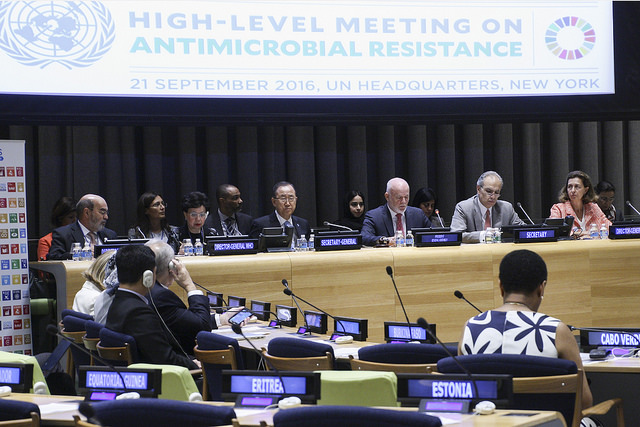Title
Codex begins new work on antimicrobial resistance
Description
In London this week, Codex will take the lead on food safety and antimicrobial resistance (AMR) as technical experts from Codex member countries set the course to combat this global threat. The meeting, hosted by the United Kingdom in collaboration with the United States and Australia will take place from 29 November - 2 December at The Chartered Institute of Environmental Health. The technical meeting will revise project documents and identify the scientific advice needed from FAO and WHO in collaboration with OIE to support this standard setting work. Clearly defining the scope of the standards will facilitate the work of the first meeting of the new Codex Task Force on AMR in 2017. Codex and AMRWork on AMR began in Codex in 2005 with the publication of the Code of Practice to Minimize and Contain Antimicrobial Resistance. A second text was published in 2011: Guidelines for Risk Analysis of Foodborne Antimicrobial Resistance. The 2016 Codex Alimentarius Commission acknowledged that AMR is a serious public health threat requiring urgent attention by Codex, and that a coordinated approach was needed at the international and national level to combat AMR. The Commission established an Intergovernmental Task Force on Antimicrobial Resistance to be hosted by the Republic of Korea which will develop a structured and long term strategy to address this global issue. The work will include revising the Code of Practice to Minimise and Contain Antimicrobial Resistance, by broadening its scope to address all uses on antimicrobials in agriculture products (i.e. animals and crops) and thus minimizing the potential development of foodborne antimicrobial resistance. The taskforce will also provide Codex members with guidance on the design and implementation of a programme for integrated surveillance of antimicrobial resistance (AMR), promoting a harmonised approach among countries to AMR surveillance, that will facilitate the exchange and analysis of data from different areas, countries and regions. What is AMR?
UN action
On 21 September 2016 at the UN in New York World leaders signaled an unprecedented level of attention to curb the spread of infections that are resistant to antimicrobial medicines. For the first time, Heads of State committed to taking a broad, coordinated approach to address the root causes of AMR across multiple sectors, especially human health, animal health and agriculture. This is only the fourth time a health issue has been taken up by the UN General Assembly (the others were HIV, noncommunicable diseases, and Ebola). The high-level meeting was convened by the President of the 71st session of the UN General Assembly, H.E. Peter Thomson. WHO - Global Action PlanCountries reaffirmed their commitment to develop national action plans on AMR, based on the Global Action Plan on Antimicrobial Resistance — the blueprint for tackling AMR developed in 2015 by the World Health Organization (WHO) in coordination with the Food and Agriculture Organization of the United Nations (FAO) and the World Organisation for Animal Health (OIE). Such plans are needed to ensure countries have a roadmap to address AMR in line with the strategic objectives of the Global Action Plan including surveillance to understand the full scale of the problem and mechanisms to stop the misuse of antimicrobial medicines in human health, animal health and agriculture. Leaders recognized the need for stronger systems to monitor drug-resistant infections and the volume of antimicrobials used in humans, animals and crops, as well as increased international cooperation and funding. They pledged to strengthen regulation of antimicrobials, improve knowledge and awareness, and promote best practices — as well as to foster innovative approaches using alternatives to antimicrobials and new technologies for diagnosis and vaccines. Links:www.oie.int/antimicrobial-resistance www.fao.org/antimicrobial-resistance
News date
28/11/2016
|

Page tools


